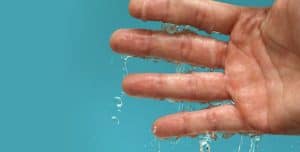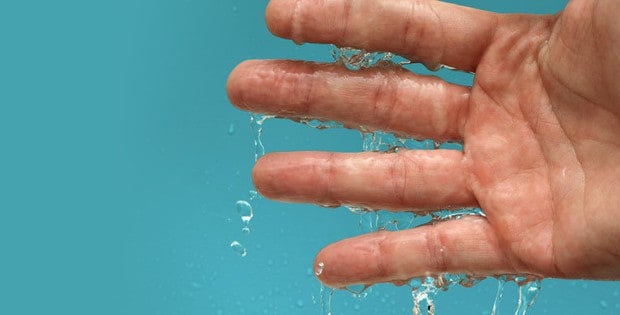
There are many reasons that you may be experiencing excessive sweating. Anxiety, medical conditions, side effects of medicine, etc. can all cause episodes of sweating. But how do you know if your excessive sweating is just a phase or a medical condition such as hyperhidrosis?
Hyperhidrosis is typically characterized by sweating so much that your clothes are soaked and sweat practically drips off of your hands in normal room temperatures. It may occur on just one part of your body, multiple areas, or your entire body. If you find yourself suddenly sweating while anxious, this is typically not hyperhidrosis and more a side effect of the anxiety you are experiencing (basically a phase). If you find yourself repeatedly sweating when you are not stressed or anxious, you may want to schedule an appointment with your dermatologist to discuss hyperhidrosis.
There are two different types of hyperhidrosis, both with unique characteristics.
- Primary focal hyperhidrosis is NOT caused by another medical condition or considered a side effect from a medication. The medical condition is sweating. The sweating with Primary Focal Hyperhidrosis happens to a very specific region of the body and are usually symmetric, meaning the left and right sides are affected. The most common areas that are affected are hands, feet, underarms, face, and head. An interesting fact about people with Primary Focal Hyperhidrosis is although they typically have episodes once or twice a week, they typically do not have episodes while they sleep.
- The other form of hyperhidrosis is known as Secondary Generalized Hyperhidrosis. This type of hyperhidrosis is characterized by excessive sweating caused by another medical condition or is a side effect of a medication. Hence the reason, it is called secondary. Typically, with Secondary Generalized Hyperhidrosis people experience sweating on larger areas of the body and unlike people with Primary Focal Hyperhidrosis, people may experience sweating spells in their sleep. The cause of your sweating may be due to a medical condition such as diabetes, PCOS, etc.
If you find that your excessive sweating is holding you back from social activities, making you avoid shaking hands, or you find yourself changing your clothes frequently, you may want to schedule an appointment with your doctor. There is no actual cure for Hyperhidrosis, however, scheduling an appointment with your dermatologist to explore the treatment options to help relieve some of the side effects of hyperhidrosis could be beneficial. There are many advanced treatments that a dermatologist can provide to give you some relief. Prescription antiperspirant, injections, and other topical medications can help bring your relief from this embarrassing and sometimes debilitating condition.
Please call our offices to explore your treatment options.
Disclaimer: This blog provides general information and discussion about medical, cosmetic, mohs, and surgical dermatology. The words and other content provided in this blog, and in any linked materials, are not intended and should not be construed as medical advice. If the reader or any other person has a medical concern, he or she should consult with an appropriately-licensed dermatologist or other health care worker.
